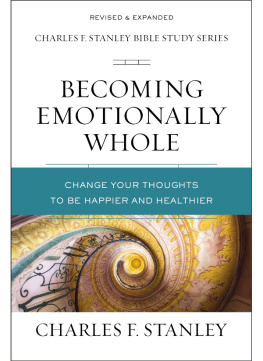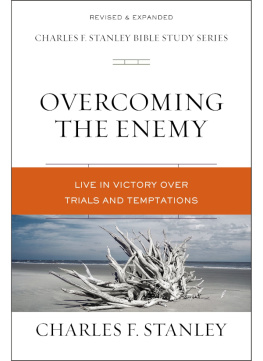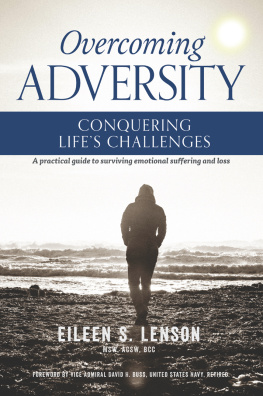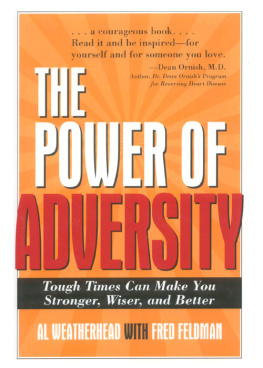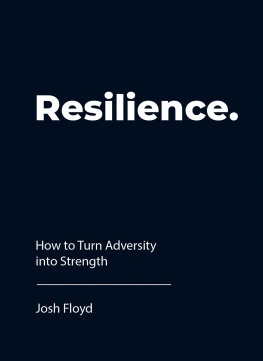1989 by Charles Stanley
All rights reserved. No portion of this book may be reproduced, stored in a retrieval system, or transmitted in any form or by any meanselectronic, mechanical, photocopy, recording, scanning, or otherexcept for brief quotations in critical reviews or articles, without the prior written permission of the publisher.
Published in Nashville, Tennessee, by Thomas Nelson. Thomas Nelson is a registered trademark of Thomas Nelson, Inc .
Thomas Nelson, Inc ., titles may be purchased in bulk for educational, business, fund-raising, or sales promotional use. For information, please e-mail SpecialMarkets@ThomasNelson.com.
Unless otherwise noted, Scripture quotations are from the NEW AMERICAN STANDARD BIBLE, 1960, 1962, 1963, 1971, 1972, 1973, 1975, 1977 by the Lockman Foundation. Used by permission.
Scripture quotations noted NKJV are from THE NEW KING JAMES VERSION. 1979, 1980, 1982 , Thomas Nelson, Inc ., Publishers.
Scripture quotations noted NIV are from the HOLY BIBLE: NEW INTERNATIONAL VERSION. 1973, 1978, 1984 by the International Bible Society. Used by permission of Zondervan Publishing House.
ISBN 978-1-4002-8050-6 (repak)
ISBN 978-1-4185-3016-7 (eBook)
Library of Congress Cataloging-in-Publication Data
Stanley, Charles F.
How to handle adversity / Charles Stanley.
p. cm.
Originally published: Nashville : Oliver-Nelson, c1989.
ISBN 978-0-7852-6418-7 (trade paper)
1. Consolation. 2. Christian life. I. Title.
BV4905.3.S725 2008
248.86dc22
2008023088
08 09 10 11 12 QW 5 4 3 2 1
Information about External Hyperlinks in this ebook
Please note that footnotes in this ebook may contain hyperlinks to external websites as part of bibliographic citations. These hyperlinks have not been activated by the publisher, who cannot verify the accuracy of these links beyond the date of publication.
To Mrs. Ralph Sauls
My steadfast inspiration in a time of great adversity
C ONTENTS
Consider it all joy, my brethren, when you encounter various trials, knowing that the testing of your faith produces endurance. And let endurance have its perfect result, that you may be perfect and complete, lacking in nothing.
J AMES 1:24
I know of several people who are mad at God because of the adversity that has come their way. One particular fellow refuses to step foot inside the church because he did not get the promotion he thought he deserved. Another lady is mad because God did not stop her daughter from marrying an unbeliever. The tragedy in each case is that these people have put themselves on the sidelines spiritually. They cannot advance one more inch spiritually until they change their perspective on adversity. The very thing God allowed into their lives as an incentive to grow has put them into a spiritual coma. Why? Because they refuse to let endurance have its perfect [maturing] result as noted above in the passage from James.
Until we are committed to the process of spiritual maturity and growth, we will never be able to experience the peace and godly wisdom that James knewthere will never be any joy in suffering.
I encourage you, as you read this book, to open your eyes to Gods faithfulness and open your heart to all the lessons He longs to teach you through your circumstances. May you emerge victorious as you discover Gods perspective on this life and the life to come.
One
A DVERSITY : W HO I S B EHIND I T A LL ?
A s Jesus and His disciples passed through Jerusalem, they came upon a man who had been blind from birth. This surfaced a question in the minds of the disciples that they must have been wrestling with for some time. They asked,
Who sinned, this man or his parents, that he should be born blind? (John 9:2)
Their dilemma was based upon a wrong assumption they had been taught all their lives, namely, that illness is a sign of Gods judgment. There was no question in their minds that someone had sinned. But who?
The disciples were trying from their limited perspective to answer a question we often find ourselves asking. It is the why question. Why did this happen? Why did my son run away? Why did my father contract cancer? Why did our house burn? Why did I lose my job? Why was I sued?
The questions are endless. Each of us has a specific list. Sometimes there is so much emotion involved we dare not even allow ourselves to verbalize the frustration we feel because asking and finding no clear-cut answer threatens the foundation of all we believe about God and His goodness. And yet, the questions still linger.
Like the disciples, we are prone to view adversity narrowly. We turn on ourselves and begin an often fruitless journey into our recentand sometimes not-so-recentpast. Our purpose is to find the reason for the adversity we face. The thought may arise: Surely this is Gods way of paying me back. If, however, we are convinced that nothing we have done merits the magnitude of our adversity, we have no choice, it seems, but to question the goodness and faithfulness of God.
In His response to the disciples question, Jesus revealed yet another error that plagued the theology of the day. But His answer did much more than that. It enlightens us and offers a much broader perspective on suffering than that held by many. His answer brings hope to those who have thus far been afraid to ask why. It allows us to look beyond ourselvesand that is always an improvement! Jesus answered, It was neither that this man sinned, nor his parents. In others words, Your thinking is too narrow. You need some new categories. I believe many well-meaning Christians need some new categories when it comes to the subject of adversity. Thinking too narrowly on this subject sets one up for needless guilt. And as in the case of Jesus disciples, it warps ones perspective on the suffering of others.
Jesus said,
It was neither that this man sinned, nor his parents; but it was in order that the works of God might be displayed in him. (John 9:3)
The implications of that statement are staggering. The phrase in order that denotes purpose. There was a purpose to this mans blindness. The disciples saw his blindness as the result of something. In fact, they saw all illness in terms of result. Jesus, however, let it be known in no uncertain terms that this blindness was not the result of something the man had done. This mans blindness was a part of Gods purpose. In other words, this mans blindness was from God. That was a difficult sentence to writemuch less believe.
Is it possible that adversity can originate with God? All of us would be more comfortable if Jesus had said, This man is blind because he sinned, but God is going to use it anyway. That would be a much easier pill to swallow. But Jesus leaves us no escape. Sin was not the direct cause of the mans blindness; God was.
A Case in Point
I am aware that such a statement flies in the face of the prosperity theology so prevalent today. Yet a statement such as this one in the gospel of John makes it perfectly clear that God is the engineer of some adversity. We cannot let our theological biases (which we all have) interfere with the clear teaching of Scripture. Fortunately for us, this blind man is not the only scriptural example of Gods engineering adversity. In 2 Corinthians 12 the apostle Paul describes his struggle with adversity. He clearly identifies God as the engineer behind his suffering:




